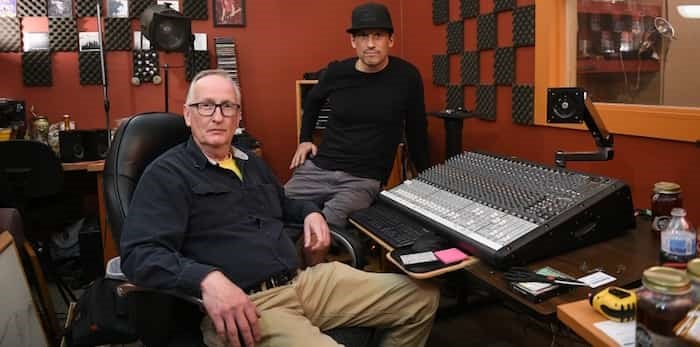 Rick Welin and Doug Fury at the now-defunct Clark Drive Studios. Photo: Dan Toulgoet
Rick Welin and Doug Fury at the now-defunct Clark Drive Studios. Photo: Dan Toulgoet
One of Vancouver’s oldest rehearsal spaces is no more.
Clark Drive Studios shut its doors Oct. 1 after 17 years in operation near the north end of Clark Drive.
The studio’s closure follows all the precursors that have killed numerous creative spaces in Vancouver: rents that rise beyond control, leases that don’t exceed two years and land owners happy to cash in on speculation galore.
Rick Welin took over the space in January 2004, two years after the studio was established. At the time, Welin charged bands $175 per month, and his monthly lease payments were about $1,700. The equivalent numbers 15 years later are no longer viable.
Welin’s lease expired Oct. 1, when the monthly rate was $3,500. The owners wanted to up that number to $5,000. With a triple net lease — paying for property tax, the lease and maintenance — Welin would be shelling out around $6,000 per month.
“There’s been lots of crying,” Welin said. “This has screwed up 30 people’s lives. It’s gone from 30 people who had a nice, casual creative environment to ‘Holy f*** we’ve been f***ed by rampant greed.’”
Former Bif Naked guitarist Doug Fury moved into the facility, which includes two recording studios and four rehearsal rooms, shortly after Welin took over. It was to be a temporary move, where Fury would write and record an album and be out within a couple months. Fury has instead been in the space for 15 years.
About 250 bands, mostly from Vancouver, have recorded albums at the studio since its inception — Bif Naked, Econoline Crush, Los Furios, Pride Tiger and members of DOA. The rehearsal space has been home to about 100 bands over that time. One group has had the same room for 14 years, and the average stay was somewhere around six years.
“Anyone I’ve told that this room is closing can’t believe it’s coming to an end,” Fury said. “We’ve been the steady Eddie that’s been around for so long. We’ve always been rock solid.”
Welin said the land his studio sat on belongs to a family-run investment company. B.C. Assessment records show the property is part of a larger parcel all under single ownership spanning half a city block near Frances Street and Clark Drive. That land’s 2019 assessed value was just under $30 million.
Welin said each subsequent lease negotiation was done in two-year increments, with $500 increases each time. Those numbers were still doable until this year’s negotiations fell through.
“We didn’t move in the past because it’s been at a reasonable price — but the building is condemnable,” Welin said. “They were giving us cheap rent because they knew the building was unfit for inhabitation. We were desperate enough to be in a building that was probably not safe.”
Welin, 61, is a lifelong Vancouverite who made half his income from the studio. Fury, 48, has lived in Vancouver since 2001 and makes all his money in the creative sector — he’s a musician, producer and engineer and works in video and audio editing.
Both said they’ve had few problems — one noise complaint in 15 years — with Vancouver police or the city in their time in the neighbourhood. In fact, the pair suggest the studio played a part in revitalizing the area, in that constant foot traffic and activity near the studio pushed any crime away.
“This whole neighbourhood was a sh**hole when we moved in — hookers on every corner and smashed windows all over the place,” Welin said.
The city passed three sprawling pieces of arts and culture legislation in early September. Among the key highlights was a push to preserve 800,000 square feet of “affordable, preserved, renewed, expanded, or new city-owned, non-profit and private space” over the next decade. The plans also calls for no net loss of existing spaces, along with more than $1 million for reconciliation and decolonization programs and other revenue streams for those who identify as marginalized or underrepresented in Vancouver’s arts scenes.
Studies that helped shape those policies found 16 studios housing about 300 artists either closed or faced closure in the last year.
The cause?
“Dramatic property tax and rent increases, competition with higher-value land uses, and development pressure,” reads a city staff report.
Staff reviewed property taxes for 11 of the studio sites and found an average tax increase of more than 77 per cent over the past five years. One studio owner said those changes have resulted in a rent increase of more than $60,000 per year.
Welin said there’s little the city can do to help for-profit arts businesses, outside of tax breaks. His property taxes jumped significantly in the last year, increasing from $8,500 to $13,500.
Welin and Fury will ultimately look for another space next year, but rehearsal rooms won’t be part of the new business model. They’ll still record bands, but their rehearsal room business will be replaced by those who work in animation or video.
“Going back home my family in Ontario is always in the back of my mind, but when things like this happen, you think maybe it’s time to speed up the process,” Fury said. “Maybe it’s time to call it and go back to my family earlier than I was originally planning. But it’s all so fresh, so I don’t know exactly how this is going to shake out.”



